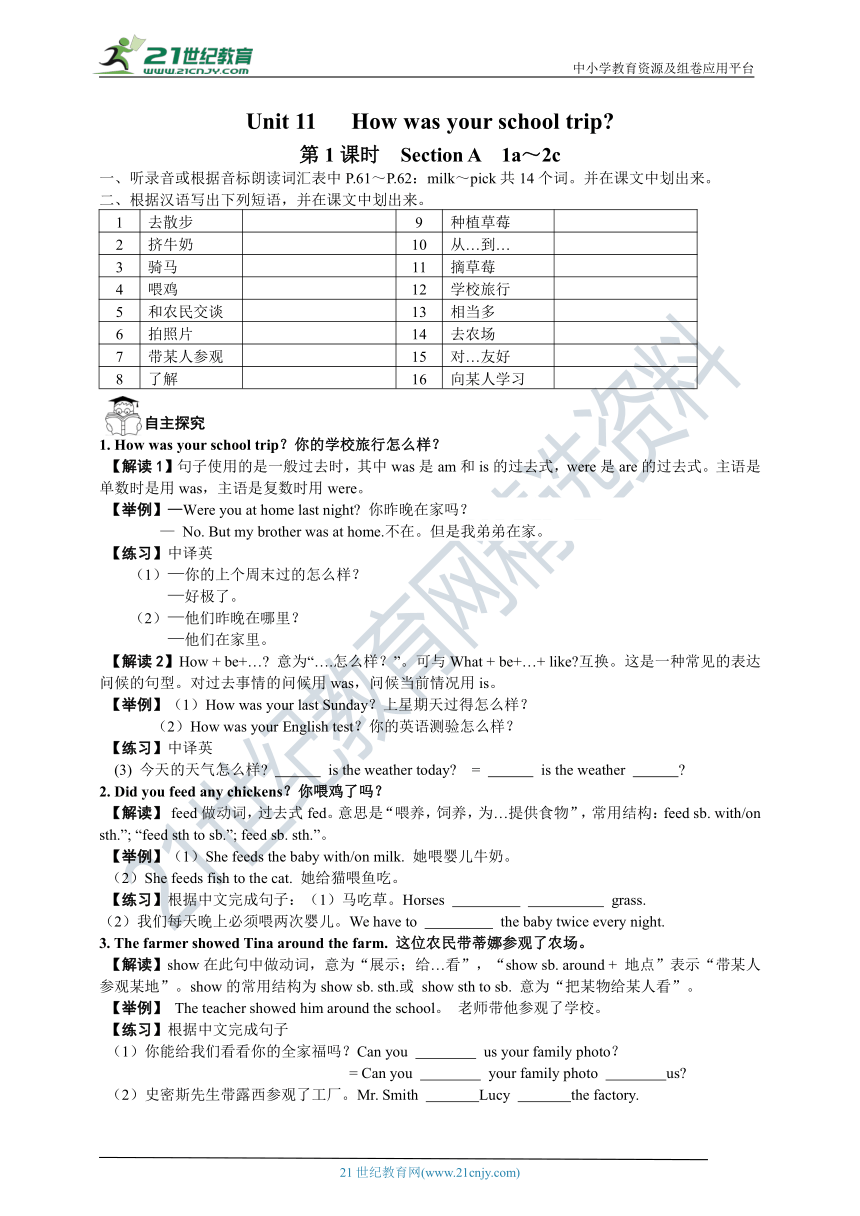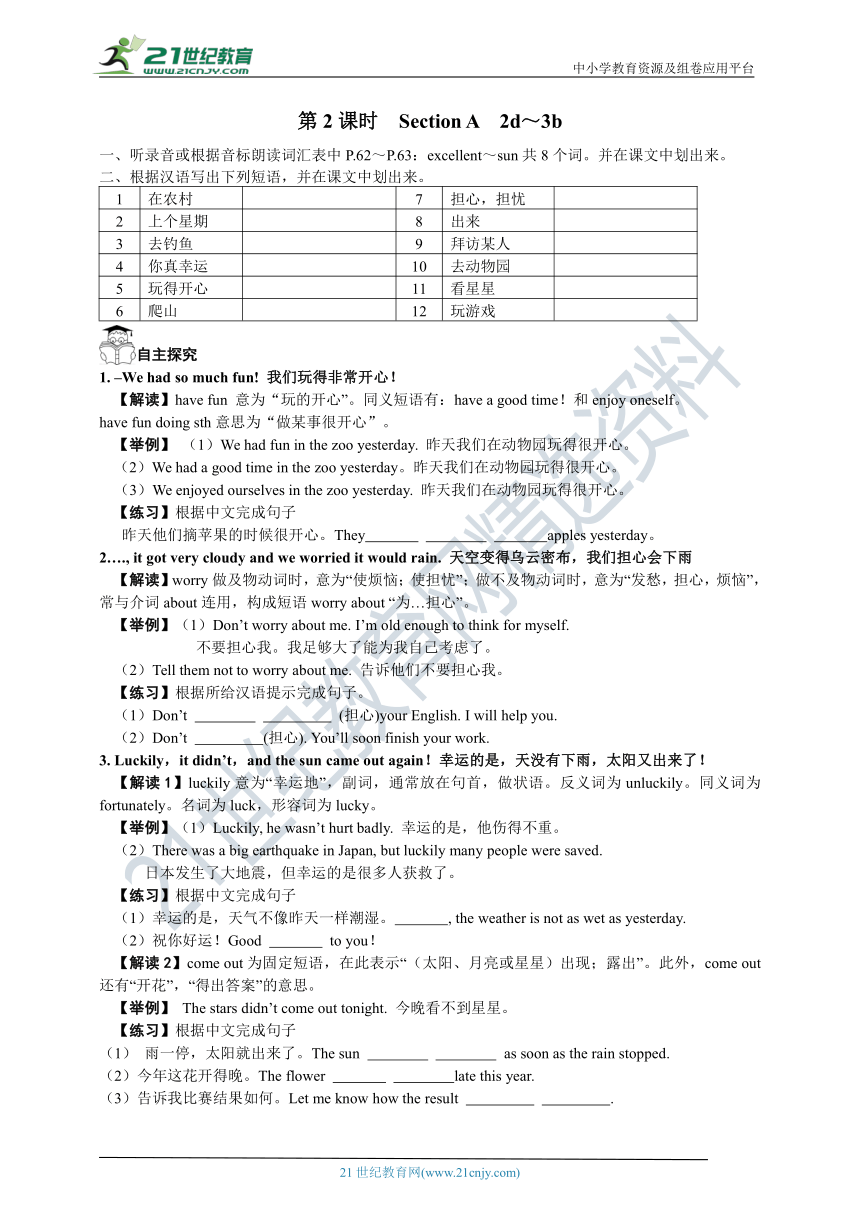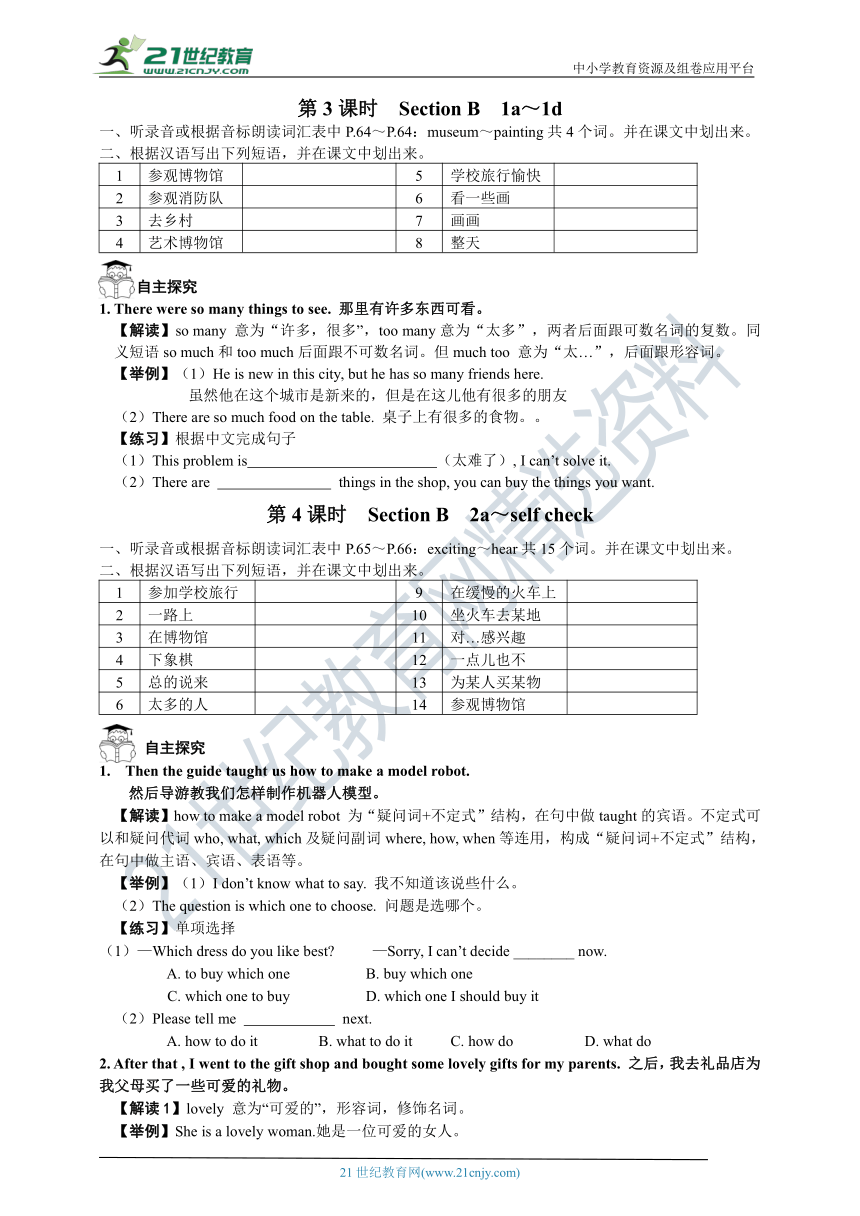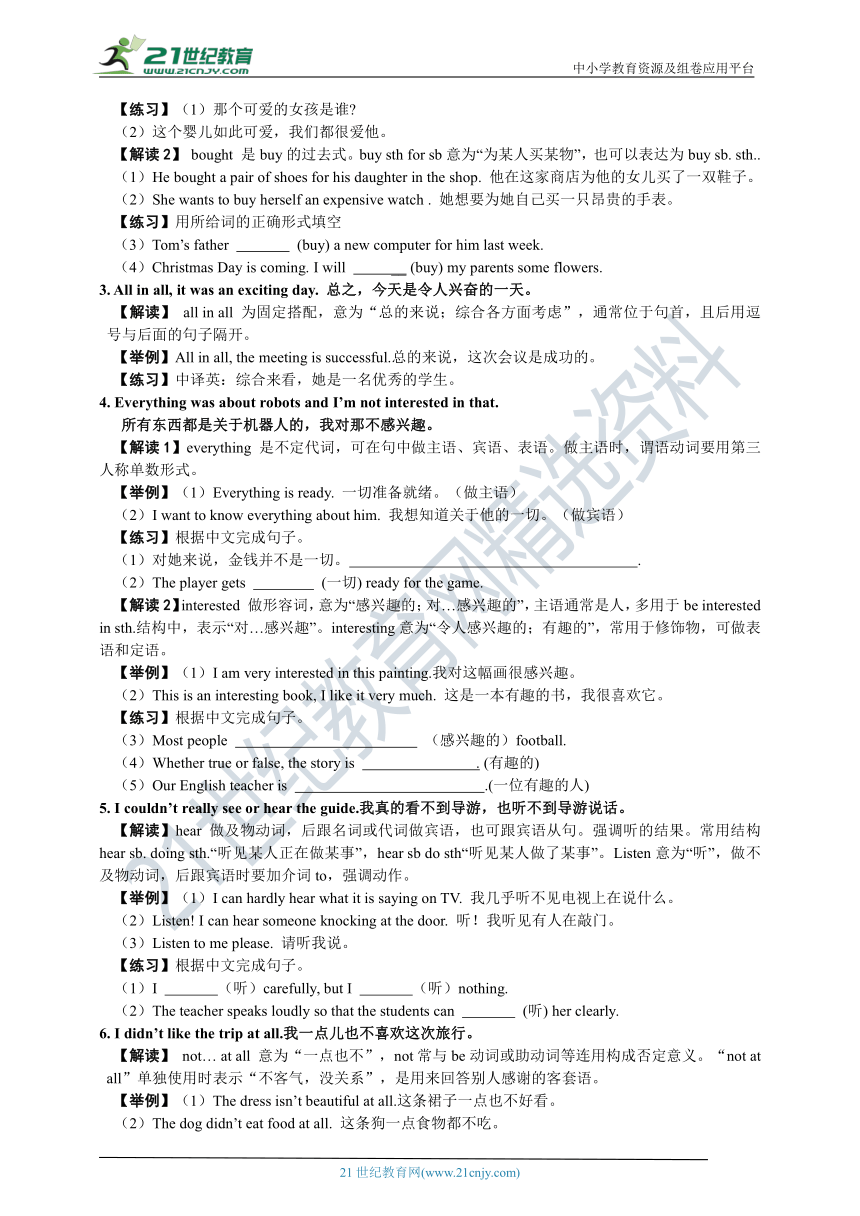Unit 11 How was your school trip? 单元同步学案(4课时 含答案)
文档属性
| 名称 | Unit 11 How was your school trip? 单元同步学案(4课时 含答案) |

|
|
| 格式 | zip | ||
| 文件大小 | 1.2MB | ||
| 资源类型 | 试卷 | ||
| 版本资源 | 人教新目标(Go for it)版 | ||
| 科目 | 英语 | ||
| 更新时间 | 2020-08-17 00:00:00 | ||
图片预览




文档简介
中小学教育资源及组卷应用平台
Unit
11
How
was
your
school
trip?
第1课时
Section
A
1a~2c
一、听录音或根据音标朗读词汇表中P.61~P.62:milk~pick共14个词。并在课文中划出来。
二、根据汉语写出下列短语,并在课文中划出来。
1
去散步
9
种植草莓
2
挤牛奶
10
从…到…
3
骑马
11
摘草莓
4
喂鸡
12
学校旅行
5
和农民交谈
13
相当多
6
拍照片
14
去农场
7
带某人参观
15
对…友好
8
了解
16
向某人学习
自主探究
1.
How
was
your
school
trip?你的学校旅行怎么样?
【解读1】句子使用的是一般过去时,其中was是am和is的过去式,were是are的过去式。主语是单数时是用was,主语是复数时用were。
【举例】—Were
you
at
home
last
night?
你昨晚在家吗?
—
No.
But
my
brother
was
at
home.不在。但是我弟弟在家。
【练习】中译英
(1)—你的上个周末过的怎么样?
—好极了。
(2)—他们昨晚在哪里?
—他们在家里。
【解读2】How
+
be+…?
意为“….怎么样?”。可与What
+
be+…+
like?互换。这是一种常见的表达问候的句型。对过去事情的问候用was,问候当前情况用is。
【举例】(1)How
was
your
last
Sunday?上星期天过得怎么样?
(2)How
was
your
English
test?你的英语测验怎么样?
【练习】中译英
(3)
今天的天气怎么样?
is
the
weather
today?
=
is
the
weather
?
2.
Did
you
feed
any
chickens?你喂鸡了吗?
【解读】
feed做动词,过去式fed。意思是“喂养,饲养,为…提供食物”,常用结构:feed
sb.
with/on
sth.”;
“feed
sth
to
sb.”;
feed
sb.
sth.”。
【举例】(1)She
feeds
the
baby
with/on
milk.
她喂婴儿牛奶。
(2)She
feeds
fish
to
the
cat.
她给猫喂鱼吃。
【练习】根据中文完成句子:(1)马吃草。Horses
grass.
(2)我们每天晚上必须喂两次婴儿。We
have
to
the
baby
twice
every
night.
3.
The
farmer
showed
Tina
around
the
farm.
这位农民带蒂娜参观了农场。
【解读】show在此句中做动词,意为“展示;给…看”,“show
sb.
around
+
地点”表示“带某人参观某地”。show的常用结构为show
sb.
sth.或
show
sth
to
sb.
意为“把某物给某人看”。
【举例】
The
teacher
showed
him
around
the
school。
老师带他参观了学校。
【练习】根据中文完成句子
(1)你能给我们看看你的全家福吗?Can
you
us
your
family
photo?
=
Can
you
your
family
photo
us?
(2)史密斯先生带露西参观了工厂。Mr.
Smith
Lucy
the
factory.
第2课时
Section
A
2d~3b
一、听录音或根据音标朗读词汇表中P.62~P.63:excellent~sun共8个词。并在课文中划出来。
二、根据汉语写出下列短语,并在课文中划出来。
1
在农村
7
担心,担忧
2
上个星期
8
出来
3
去钓鱼
9
拜访某人
4
你真幸运
10
去动物园
5
玩得开心
11
看星星
6
爬山
12
玩游戏
自主探究
1.
–We
had
so
much
fun!
我们玩得非常开心!
【解读】have
fun
意为“玩的开心”。同义短语有:have
a
good
time!和enjoy
oneself。
have
fun
doing
sth意思为“做某事很开心”。
【举例】
(1)We
had
fun
in
the
zoo
yesterday.
昨天我们在动物园玩得很开心。
(2)We
had
a
good
time
in
the
zoo
yesterday。昨天我们在动物园玩得很开心。
(3)We
enjoyed
ourselves
in
the
zoo
yesterday.
昨天我们在动物园玩得很开心。
【练习】根据中文完成句子
昨天他们摘苹果的时候很开心。They
apples
yesterday。
2….,
it
got
very
cloudy
and
we
worried
it
would
rain.
天空变得乌云密布,我们担心会下雨
【解读】worry做及物动词时,意为“使烦恼;使担忧”;做不及物动词时,意为“发愁,担心,烦恼”,常与介词about连用,构成短语worry
about
“为…担心”。
【举例】(1)Don’t
worry
about
me.
I’m
old
enough
to
think
for
myself.
不要担心我。我足够大了能为我自己考虑了。
(2)Tell
them
not
to
worry
about
me.
告诉他们不要担心我。
【练习】根据所给汉语提示完成句子。
(1)Don’t
(担心)your
English.
I
will
help
you.
(2)Don’t
(担心).
You’ll
soon
finish
your
work.
3.
Luckily,it
didn’t,and
the
sun
came
out
again!幸运的是,天没有下雨,太阳又出来了!
【解读1】luckily意为“幸运地”,副词,通常放在句首,做状语。反义词为unluckily。同义词为fortunately。名词为luck,形容词为lucky。
【举例】(1)Luckily,
he
wasn’t
hurt
badly.
幸运的是,他伤得不重。
(2)There
was
a
big
earthquake
in
Japan,
but
luckily
many
people
were
saved.
日本发生了大地震,但幸运的是很多人获救了。
【练习】根据中文完成句子
(1)幸运的是,天气不像昨天一样潮湿。
,
the
weather
is
not
as
wet
as
yesterday.
(2)祝你好运!Good
to
you!
【解读2】come
out为固定短语,在此表示“(太阳、月亮或星星)出现;露出”。此外,come
out还有“开花”,“得出答案”的意思。
【举例】
The
stars
didn’t
come
out
tonight.
今晚看不到星星。
【练习】根据中文完成句子
(1)
雨一停,太阳就出来了。The
sun
as
soon
as
the
rain
stopped.
(2)今年这花开得晚。The
flower
late
this
year.
(3)告诉我比赛结果如何。Let
me
know
how
the
result
.
第3课时
Section
B
1a~1d
一、听录音或根据音标朗读词汇表中P.64~P.64:museum~painting共4个词。并在课文中划出来。
二、根据汉语写出下列短语,并在课文中划出来。
1
参观博物馆
5
学校旅行愉快
2
参观消防队
6
看一些画
3
去乡村
7
画画
4
艺术博物馆
8
整天
自主探究
1.
There
were
so
many
things
to
see.
那里有许多东西可看。
【解读】so
many
意为“许多,很多”,too
many意为“太多”,两者后面跟可数名词的复数。同义短语so
much和too
much后面跟不可数名词。但much
too
意为“太…”,后面跟形容词。
【举例】(1)He
is
new
in
this
city,
but
he
has
so
many
friends
here.
虽然他在这个城市是新来的,但是在这儿他有很多的朋友
(2)There
are
so
much
food
on
the
table.
桌子上有很多的食物。。
【练习】根据中文完成句子
(1)This
problem
is
(太难了),
I
can’t
solve
it.
(2)There
are
things
in
the
shop,
you
can
buy
the
things
you
want.
第4课时
Section
B
2a~self
check
一、听录音或根据音标朗读词汇表中P.65~P.66:exciting~hear共15个词。并在课文中划出来。
二、根据汉语写出下列短语,并在课文中划出来。
1
参加学校旅行
9
在缓慢的火车上
2
一路上
10
坐火车去某地
3
在博物馆
11
对…感兴趣
4
下象棋
12
一点儿也不
5
总的说来
13
为某人买某物
6
太多的人
14
参观博物馆
自主探究
1.
Then
the
guide
taught
us
how
to
make
a
model
robot.
然后导游教我们怎样制作机器人模型。
【解读】how
to
make
a
model
robot
为“疑问词+不定式”结构,在句中做taught的宾语。不定式可以和疑问代词who,
what,
which及疑问副词where,
how,
when等连用,构成“疑问词+不定式”结构,在句中做主语、宾语、表语等。
【举例】(1)I
don’t
know
what
to
say.
我不知道该说些什么。
(2)The
question
is
which
one
to
choose.
问题是选哪个。
【练习】单项选择
(1)—Which
dress
do
you
like
best?
—Sorry,
I
can’t
decide
________
now.
A.
to
buy
which
one
B.
buy
which
one
C.
which
one
to
buy
D.
which
one
I
should
buy
it
(2)Please
tell
me
next.
A.
how
to
do
it
B.
what
to
do
it
C.
how
do
D.
what
do
2.
After
that
,
I
went
to
the
gift
shop
and
bought
some
lovely
gifts
for
my
parents.
之后,我去礼品店为我父母买了一些可爱的礼物。
【解读1】lovely
意为“可爱的”,形容词,修饰名词。
【举例】She
is
a
lovely
woman.她是一位可爱的女人。
【练习】(1)那个可爱的女孩是谁?
(2)这个婴儿如此可爱,我们都很爱他。
【解读2】
bought
是buy的过去式。buy
sth
for
sb意为“为某人买某物”,也可以表达为buy
sb.
sth..
(1)He
bought
a
pair
of
shoes
for
his
daughter
in
the
shop.
他在这家商店为他的女儿买了一双鞋子。
(2)She
wants
to
buy
herself
an
expensive
watch
.
她想要为她自己买一只昂贵的手表。
【练习】用所给词的正确形式填空
(3)Tom’s
father
(buy)
a
new
computer
for
him
last
week.
(4)Christmas
Day
is
coming.
I
will
__
(buy)
my
parents
some
flowers.
3.
All
in
all,
it
was
an
exciting
day.
总之,今天是令人兴奋的一天。
【解读】
all
in
all
为固定搭配,意为“总的来说;综合各方面考虑”,通常位于句首,且后用逗号与后面的句子隔开。
【举例】All
in
all,
the
meeting
is
successful.总的来说,这次会议是成功的。
【练习】中译英:综合来看,她是一名优秀的学生。
4.
Everything
was
about
robots
and
I’m
not
interested
in
that.
所有东西都是关于机器人的,我对那不感兴趣。
【解读1】everything
是不定代词,可在句中做主语、宾语、表语。做主语时,谓语动词要用第三人称单数形式。
【举例】(1)Everything
is
ready.
一切准备就绪。(做主语)
(2)I
want
to
know
everything
about
him.
我想知道关于他的一切。(做宾语)
【练习】根据中文完成句子。
(1)对她来说,金钱并不是一切。
.
(2)The
player
gets
(一切)
ready
for
the
game.
【解读2】interested
做形容词,意为“感兴趣的;对…感兴趣的”,主语通常是人,多用于be
interested
in
sth.结构中,表示“对…感兴趣”。interesting意为“令人感兴趣的;有趣的”,常用于修饰物,可做表语和定语。
【举例】(1)I
am
very
interested
in
this
painting.我对这幅画很感兴趣。
(2)This
is
an
interesting
book,
I
like
it
very
much.
这是一本有趣的书,我很喜欢它。
【练习】根据中文完成句子。
(3)Most
people
(感兴趣的)football.
(4)Whether
true
or
false,
the
story
is
.
(有趣的)
(5)Our
English
teacher
is
.(一位有趣的人)
5.
I
couldn’t
really
see
or
hear
the
guide.我真的看不到导游,也听不到导游说话。
【解读】hear
做及物动词,后跟名词或代词做宾语,也可跟宾语从句。强调听的结果。常用结构hear
sb.
doing
sth.“听见某人正在做某事”,hear
sb
do
sth“听见某人做了某事”。Listen意为“听”,做不及物动词,后跟宾语时要加介词to,强调动作。
【举例】(1)I
can
hardly
hear
what
it
is
saying
on
TV.
我几乎听不见电视上在说什么。
(2)Listen!
I
can
hear
someone
knocking
at
the
door.
听!我听见有人在敲门。
(3)Listen
to
me
please.
请听我说。
【练习】根据中文完成句子。
(1)I
(听)carefully,
but
I
(听)nothing.
(2)The
teacher
speaks
loudly
so
that
the
students
can
(听)
her
clearly.
6.
I
didn’t
like
the
trip
at
all.我一点儿也不喜欢这次旅行。
【解读】
not…
at
all
意为“一点也不”,not常与be动词或助动词等连用构成否定意义。“not
at
all”单独使用时表示“不客气,没关系”,是用来回答别人感谢的客套语。
【举例】(1)The
dress
isn’t
beautiful
at
all.这条裙子一点也不好看。
(2)The
dog
didn’t
eat
food
at
all.
这条狗一点食物都不吃。
【练习】根据中文完成句子。
(1)--What
a
nice
meal!
It’s
really
kind
of
you
to
invite
us.
--
.
I’m
glad
you
like
it.
A.
Not
at
all
B.
Sounds
good
C.
Well
done
D.
Never
mind
(2)Sam一点儿也不喜欢他的新工作。Sam
doesn’t
like
his
new
job
.
(3)—
Thank
you
for
your
help.谢谢你的帮助。—
(不客气)。
参考答案:
第1课时
Section
A
1a~2c
二、短语理解
1.
go
for
a
walk
2.
milk
a
cow
3.
ride
a
horse
4.
feed
the
chickens
5.
talk
with
the
farmer
6.
take
photos
7.
show
sb.
around
8.
learn
about
9.
grow
strawberries
10.
from…to
11.
pick
strawberries
12.
school
trip
13.
quite
a
lot
14.
go
to
the
farm
15.
be
friendly
to
16.
learn
from
sb.
自主探究
1.
(1)
—
How
was
your
last
weekend?
—Great.
(2)
—Where
were
they
yesterday
evening?
—They
were
at
home.
(3)
How
,
What
,
like
2.
(1)
feed,
on
(2)
feed
3.
(1)
show
,
show
,
to
(2)
showed,
around
第2课时
Section
A
2d~3b
二、短语理解
1.in
the
countryside
2.
last
week
3.
go
fishing
4.
lucky
you
5.
have
fun
6.climb
a
mountain
7.
worry
about
8.
come
out
9.visit
sb
10.go
to
the
zoo
11.watch
stars
12.play
games
自主探究
1.
(1)
had
fun
picking
2.
(1)worry
about
(2)worry
3.
(1)
Luckily
(2)
luck
(3)
came
out
(4)
came
out
(5)
comes
out
第3课时
Section
B
1a~1d
二、短语理解
1.visit
a
museum
2.
visit
a
fire
station
3.
go
to
the
countryside
4.
an
art
museum
5.
have
a
great
school
trip
6.
see
some
paintings
7.draw
pictures
8.
all
day
long
自主探究
1.
(1)
much
too
difficult
(2)
too
many
第4课时
Section
B
2a~self
check
二、短语理解
1.go
on
a
school
trip
2.along
the
way
3.at
the
museum
4.play
chess
5.
all
in
all
6.too
many
people
7.on
the
slow
train
8.take
the
train
to
9.be
interested
in
10.not
at
all
11.buy
sth
for
12.
visit
the
museum
自主探究
1.
(1)
C
(2)
A
2.
(1)
Who
is
that
lovely
girl?
(2)
The
baby
is
so
lovely
that
we
all
love
her
very
much.
(3)
bought
(4)buy
3.
(1)
All
in
all,
she
is
an
excellent
student.
4.
(1)
Money
isn’t
everything
to
her.
(2)
everything
(3)
are
interested
in
(4)
interesting
(5)
an
interesting
man
5.
(1)
listened
,
heard
(2)
hear
6.
(1)
A
(2)
at
all
(3)
Not
at
all
21世纪教育网
www.21cnjy.com
精品试卷·第
2
页
(共
2
页)
HYPERLINK
"http://21世纪教育网(www.21cnjy.com)
"
21世纪教育网(www.21cnjy.com)
Unit
11
How
was
your
school
trip?
第1课时
Section
A
1a~2c
一、听录音或根据音标朗读词汇表中P.61~P.62:milk~pick共14个词。并在课文中划出来。
二、根据汉语写出下列短语,并在课文中划出来。
1
去散步
9
种植草莓
2
挤牛奶
10
从…到…
3
骑马
11
摘草莓
4
喂鸡
12
学校旅行
5
和农民交谈
13
相当多
6
拍照片
14
去农场
7
带某人参观
15
对…友好
8
了解
16
向某人学习
自主探究
1.
How
was
your
school
trip?你的学校旅行怎么样?
【解读1】句子使用的是一般过去时,其中was是am和is的过去式,were是are的过去式。主语是单数时是用was,主语是复数时用were。
【举例】—Were
you
at
home
last
night?
你昨晚在家吗?
—
No.
But
my
brother
was
at
home.不在。但是我弟弟在家。
【练习】中译英
(1)—你的上个周末过的怎么样?
—好极了。
(2)—他们昨晚在哪里?
—他们在家里。
【解读2】How
+
be+…?
意为“….怎么样?”。可与What
+
be+…+
like?互换。这是一种常见的表达问候的句型。对过去事情的问候用was,问候当前情况用is。
【举例】(1)How
was
your
last
Sunday?上星期天过得怎么样?
(2)How
was
your
English
test?你的英语测验怎么样?
【练习】中译英
(3)
今天的天气怎么样?
is
the
weather
today?
=
is
the
weather
?
2.
Did
you
feed
any
chickens?你喂鸡了吗?
【解读】
feed做动词,过去式fed。意思是“喂养,饲养,为…提供食物”,常用结构:feed
sb.
with/on
sth.”;
“feed
sth
to
sb.”;
feed
sb.
sth.”。
【举例】(1)She
feeds
the
baby
with/on
milk.
她喂婴儿牛奶。
(2)She
feeds
fish
to
the
cat.
她给猫喂鱼吃。
【练习】根据中文完成句子:(1)马吃草。Horses
grass.
(2)我们每天晚上必须喂两次婴儿。We
have
to
the
baby
twice
every
night.
3.
The
farmer
showed
Tina
around
the
farm.
这位农民带蒂娜参观了农场。
【解读】show在此句中做动词,意为“展示;给…看”,“show
sb.
around
+
地点”表示“带某人参观某地”。show的常用结构为show
sb.
sth.或
show
sth
to
sb.
意为“把某物给某人看”。
【举例】
The
teacher
showed
him
around
the
school。
老师带他参观了学校。
【练习】根据中文完成句子
(1)你能给我们看看你的全家福吗?Can
you
us
your
family
photo?
=
Can
you
your
family
photo
us?
(2)史密斯先生带露西参观了工厂。Mr.
Smith
Lucy
the
factory.
第2课时
Section
A
2d~3b
一、听录音或根据音标朗读词汇表中P.62~P.63:excellent~sun共8个词。并在课文中划出来。
二、根据汉语写出下列短语,并在课文中划出来。
1
在农村
7
担心,担忧
2
上个星期
8
出来
3
去钓鱼
9
拜访某人
4
你真幸运
10
去动物园
5
玩得开心
11
看星星
6
爬山
12
玩游戏
自主探究
1.
–We
had
so
much
fun!
我们玩得非常开心!
【解读】have
fun
意为“玩的开心”。同义短语有:have
a
good
time!和enjoy
oneself。
have
fun
doing
sth意思为“做某事很开心”。
【举例】
(1)We
had
fun
in
the
zoo
yesterday.
昨天我们在动物园玩得很开心。
(2)We
had
a
good
time
in
the
zoo
yesterday。昨天我们在动物园玩得很开心。
(3)We
enjoyed
ourselves
in
the
zoo
yesterday.
昨天我们在动物园玩得很开心。
【练习】根据中文完成句子
昨天他们摘苹果的时候很开心。They
apples
yesterday。
2….,
it
got
very
cloudy
and
we
worried
it
would
rain.
天空变得乌云密布,我们担心会下雨
【解读】worry做及物动词时,意为“使烦恼;使担忧”;做不及物动词时,意为“发愁,担心,烦恼”,常与介词about连用,构成短语worry
about
“为…担心”。
【举例】(1)Don’t
worry
about
me.
I’m
old
enough
to
think
for
myself.
不要担心我。我足够大了能为我自己考虑了。
(2)Tell
them
not
to
worry
about
me.
告诉他们不要担心我。
【练习】根据所给汉语提示完成句子。
(1)Don’t
(担心)your
English.
I
will
help
you.
(2)Don’t
(担心).
You’ll
soon
finish
your
work.
3.
Luckily,it
didn’t,and
the
sun
came
out
again!幸运的是,天没有下雨,太阳又出来了!
【解读1】luckily意为“幸运地”,副词,通常放在句首,做状语。反义词为unluckily。同义词为fortunately。名词为luck,形容词为lucky。
【举例】(1)Luckily,
he
wasn’t
hurt
badly.
幸运的是,他伤得不重。
(2)There
was
a
big
earthquake
in
Japan,
but
luckily
many
people
were
saved.
日本发生了大地震,但幸运的是很多人获救了。
【练习】根据中文完成句子
(1)幸运的是,天气不像昨天一样潮湿。
,
the
weather
is
not
as
wet
as
yesterday.
(2)祝你好运!Good
to
you!
【解读2】come
out为固定短语,在此表示“(太阳、月亮或星星)出现;露出”。此外,come
out还有“开花”,“得出答案”的意思。
【举例】
The
stars
didn’t
come
out
tonight.
今晚看不到星星。
【练习】根据中文完成句子
(1)
雨一停,太阳就出来了。The
sun
as
soon
as
the
rain
stopped.
(2)今年这花开得晚。The
flower
late
this
year.
(3)告诉我比赛结果如何。Let
me
know
how
the
result
.
第3课时
Section
B
1a~1d
一、听录音或根据音标朗读词汇表中P.64~P.64:museum~painting共4个词。并在课文中划出来。
二、根据汉语写出下列短语,并在课文中划出来。
1
参观博物馆
5
学校旅行愉快
2
参观消防队
6
看一些画
3
去乡村
7
画画
4
艺术博物馆
8
整天
自主探究
1.
There
were
so
many
things
to
see.
那里有许多东西可看。
【解读】so
many
意为“许多,很多”,too
many意为“太多”,两者后面跟可数名词的复数。同义短语so
much和too
much后面跟不可数名词。但much
too
意为“太…”,后面跟形容词。
【举例】(1)He
is
new
in
this
city,
but
he
has
so
many
friends
here.
虽然他在这个城市是新来的,但是在这儿他有很多的朋友
(2)There
are
so
much
food
on
the
table.
桌子上有很多的食物。。
【练习】根据中文完成句子
(1)This
problem
is
(太难了),
I
can’t
solve
it.
(2)There
are
things
in
the
shop,
you
can
buy
the
things
you
want.
第4课时
Section
B
2a~self
check
一、听录音或根据音标朗读词汇表中P.65~P.66:exciting~hear共15个词。并在课文中划出来。
二、根据汉语写出下列短语,并在课文中划出来。
1
参加学校旅行
9
在缓慢的火车上
2
一路上
10
坐火车去某地
3
在博物馆
11
对…感兴趣
4
下象棋
12
一点儿也不
5
总的说来
13
为某人买某物
6
太多的人
14
参观博物馆
自主探究
1.
Then
the
guide
taught
us
how
to
make
a
model
robot.
然后导游教我们怎样制作机器人模型。
【解读】how
to
make
a
model
robot
为“疑问词+不定式”结构,在句中做taught的宾语。不定式可以和疑问代词who,
what,
which及疑问副词where,
how,
when等连用,构成“疑问词+不定式”结构,在句中做主语、宾语、表语等。
【举例】(1)I
don’t
know
what
to
say.
我不知道该说些什么。
(2)The
question
is
which
one
to
choose.
问题是选哪个。
【练习】单项选择
(1)—Which
dress
do
you
like
best?
—Sorry,
I
can’t
decide
________
now.
A.
to
buy
which
one
B.
buy
which
one
C.
which
one
to
buy
D.
which
one
I
should
buy
it
(2)Please
tell
me
next.
A.
how
to
do
it
B.
what
to
do
it
C.
how
do
D.
what
do
2.
After
that
,
I
went
to
the
gift
shop
and
bought
some
lovely
gifts
for
my
parents.
之后,我去礼品店为我父母买了一些可爱的礼物。
【解读1】lovely
意为“可爱的”,形容词,修饰名词。
【举例】She
is
a
lovely
woman.她是一位可爱的女人。
【练习】(1)那个可爱的女孩是谁?
(2)这个婴儿如此可爱,我们都很爱他。
【解读2】
bought
是buy的过去式。buy
sth
for
sb意为“为某人买某物”,也可以表达为buy
sb.
sth..
(1)He
bought
a
pair
of
shoes
for
his
daughter
in
the
shop.
他在这家商店为他的女儿买了一双鞋子。
(2)She
wants
to
buy
herself
an
expensive
watch
.
她想要为她自己买一只昂贵的手表。
【练习】用所给词的正确形式填空
(3)Tom’s
father
(buy)
a
new
computer
for
him
last
week.
(4)Christmas
Day
is
coming.
I
will
__
(buy)
my
parents
some
flowers.
3.
All
in
all,
it
was
an
exciting
day.
总之,今天是令人兴奋的一天。
【解读】
all
in
all
为固定搭配,意为“总的来说;综合各方面考虑”,通常位于句首,且后用逗号与后面的句子隔开。
【举例】All
in
all,
the
meeting
is
successful.总的来说,这次会议是成功的。
【练习】中译英:综合来看,她是一名优秀的学生。
4.
Everything
was
about
robots
and
I’m
not
interested
in
that.
所有东西都是关于机器人的,我对那不感兴趣。
【解读1】everything
是不定代词,可在句中做主语、宾语、表语。做主语时,谓语动词要用第三人称单数形式。
【举例】(1)Everything
is
ready.
一切准备就绪。(做主语)
(2)I
want
to
know
everything
about
him.
我想知道关于他的一切。(做宾语)
【练习】根据中文完成句子。
(1)对她来说,金钱并不是一切。
.
(2)The
player
gets
(一切)
ready
for
the
game.
【解读2】interested
做形容词,意为“感兴趣的;对…感兴趣的”,主语通常是人,多用于be
interested
in
sth.结构中,表示“对…感兴趣”。interesting意为“令人感兴趣的;有趣的”,常用于修饰物,可做表语和定语。
【举例】(1)I
am
very
interested
in
this
painting.我对这幅画很感兴趣。
(2)This
is
an
interesting
book,
I
like
it
very
much.
这是一本有趣的书,我很喜欢它。
【练习】根据中文完成句子。
(3)Most
people
(感兴趣的)football.
(4)Whether
true
or
false,
the
story
is
.
(有趣的)
(5)Our
English
teacher
is
.(一位有趣的人)
5.
I
couldn’t
really
see
or
hear
the
guide.我真的看不到导游,也听不到导游说话。
【解读】hear
做及物动词,后跟名词或代词做宾语,也可跟宾语从句。强调听的结果。常用结构hear
sb.
doing
sth.“听见某人正在做某事”,hear
sb
do
sth“听见某人做了某事”。Listen意为“听”,做不及物动词,后跟宾语时要加介词to,强调动作。
【举例】(1)I
can
hardly
hear
what
it
is
saying
on
TV.
我几乎听不见电视上在说什么。
(2)Listen!
I
can
hear
someone
knocking
at
the
door.
听!我听见有人在敲门。
(3)Listen
to
me
please.
请听我说。
【练习】根据中文完成句子。
(1)I
(听)carefully,
but
I
(听)nothing.
(2)The
teacher
speaks
loudly
so
that
the
students
can
(听)
her
clearly.
6.
I
didn’t
like
the
trip
at
all.我一点儿也不喜欢这次旅行。
【解读】
not…
at
all
意为“一点也不”,not常与be动词或助动词等连用构成否定意义。“not
at
all”单独使用时表示“不客气,没关系”,是用来回答别人感谢的客套语。
【举例】(1)The
dress
isn’t
beautiful
at
all.这条裙子一点也不好看。
(2)The
dog
didn’t
eat
food
at
all.
这条狗一点食物都不吃。
【练习】根据中文完成句子。
(1)--What
a
nice
meal!
It’s
really
kind
of
you
to
invite
us.
--
.
I’m
glad
you
like
it.
A.
Not
at
all
B.
Sounds
good
C.
Well
done
D.
Never
mind
(2)Sam一点儿也不喜欢他的新工作。Sam
doesn’t
like
his
new
job
.
(3)—
Thank
you
for
your
help.谢谢你的帮助。—
(不客气)。
参考答案:
第1课时
Section
A
1a~2c
二、短语理解
1.
go
for
a
walk
2.
milk
a
cow
3.
ride
a
horse
4.
feed
the
chickens
5.
talk
with
the
farmer
6.
take
photos
7.
show
sb.
around
8.
learn
about
9.
grow
strawberries
10.
from…to
11.
pick
strawberries
12.
school
trip
13.
quite
a
lot
14.
go
to
the
farm
15.
be
friendly
to
16.
learn
from
sb.
自主探究
1.
(1)
—
How
was
your
last
weekend?
—Great.
(2)
—Where
were
they
yesterday
evening?
—They
were
at
home.
(3)
How
,
What
,
like
2.
(1)
feed,
on
(2)
feed
3.
(1)
show
,
show
,
to
(2)
showed,
around
第2课时
Section
A
2d~3b
二、短语理解
1.in
the
countryside
2.
last
week
3.
go
fishing
4.
lucky
you
5.
have
fun
6.climb
a
mountain
7.
worry
about
8.
come
out
9.visit
sb
10.go
to
the
zoo
11.watch
stars
12.play
games
自主探究
1.
(1)
had
fun
picking
2.
(1)worry
about
(2)worry
3.
(1)
Luckily
(2)
luck
(3)
came
out
(4)
came
out
(5)
comes
out
第3课时
Section
B
1a~1d
二、短语理解
1.visit
a
museum
2.
visit
a
fire
station
3.
go
to
the
countryside
4.
an
art
museum
5.
have
a
great
school
trip
6.
see
some
paintings
7.draw
pictures
8.
all
day
long
自主探究
1.
(1)
much
too
difficult
(2)
too
many
第4课时
Section
B
2a~self
check
二、短语理解
1.go
on
a
school
trip
2.along
the
way
3.at
the
museum
4.play
chess
5.
all
in
all
6.too
many
people
7.on
the
slow
train
8.take
the
train
to
9.be
interested
in
10.not
at
all
11.buy
sth
for
12.
visit
the
museum
自主探究
1.
(1)
C
(2)
A
2.
(1)
Who
is
that
lovely
girl?
(2)
The
baby
is
so
lovely
that
we
all
love
her
very
much.
(3)
bought
(4)buy
3.
(1)
All
in
all,
she
is
an
excellent
student.
4.
(1)
Money
isn’t
everything
to
her.
(2)
everything
(3)
are
interested
in
(4)
interesting
(5)
an
interesting
man
5.
(1)
listened
,
heard
(2)
hear
6.
(1)
A
(2)
at
all
(3)
Not
at
all
21世纪教育网
www.21cnjy.com
精品试卷·第
2
页
(共
2
页)
HYPERLINK
"http://21世纪教育网(www.21cnjy.com)
"
21世纪教育网(www.21cnjy.com)
同课章节目录
- Unit 1 Can you play the guitar?
- Section A
- Section B
- Unit 2 What time do you go to school?
- Section A
- Section B
- Unit 3 How do you get to school?
- Section A
- Section B
- Unit 4 Don't eat in class.
- Section A
- Section B
- Unit 5 Why do you like pandas?
- Section A
- Section B
- Unit 6 I'm watching TV.
- Section A
- Section B
- Review of Units 1-6
- Unit 7 It's raining!
- Section A
- Section B
- Unit 8 Is there a post office near here?
- Section A
- Section B
- Unit 9 What does he look like?
- Section A
- Section B
- Unit 10 I'd like some noodles.
- Section A
- Section B
- Unit 11 How was your school trip?
- Section A
- Section B
- Unit 12 What did you do last weekend?
- Section A
- Section B
